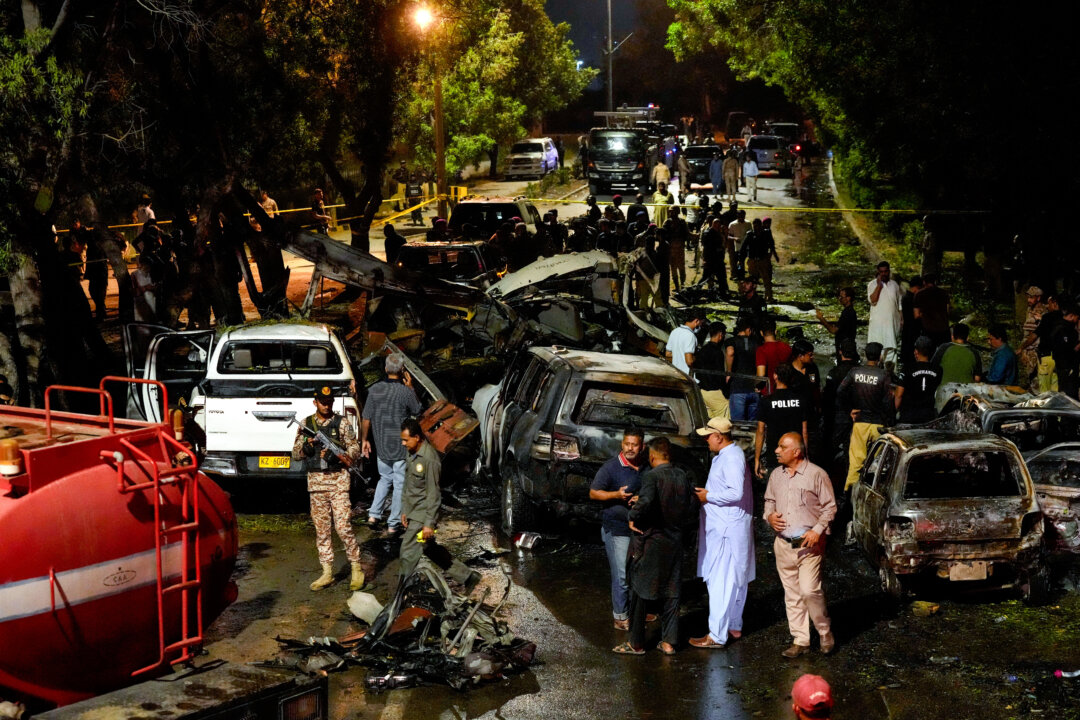A terrorist group has claimed responsibility for the attack targeting Chinese engineers.
Two Chinese nationals were killed, and at least eight more people were injured in an explosion on the night of Oct. 6 near Jinnah International Airport in Karachi, southern Pakistan, in the latest deadly attack on Chinese in Pakistan.
The Chinese Embassy said it was a “terrorist attack,” and the U.S.-designated terrorist group Baloch Liberation Army (BLA) took credit for the attack in a statement emailed to journalists on Oct. 7.
The BLA claimed that the attack was carried out using an improvised explosive device transported by a suicide bomber in a vehicle, targeting Chinese engineers at Pakistan’s largest airport.
Local police and government agencies reported that a tanker had exploded at about 11 p.m. local time on Oct. 6, and video footage showed flames engulfing cars after the explosion. There was a heavy military deployment at the airport, which was cordoned off.
The group that was attacked was a convoy of the Port Qasim Electric Power Company, which included the two Chinese nationals killed and another injured person.
The attack comes a week before Pakistan is set to host a Shanghai Cooperation Organization summit, which was co-founded by China and Russia to grow alliances to counter the West.The Chinese Embassy said it was working with Pakistani authorities to handle the aftermath, and Pakistani Prime Minister Shehbaz Sharif said on social media platform X that an investigation was underway.
“We will leave no stone unturned to ensure their security and well-being,” Sharif wrote.
China’s relationship with Pakistan is a key component of the Chinese Communist Party’s (CCP) Belt and Road Initiative.
A key feature of the initiative is underwriting large foreign infrastructure projects with repayment plans dependent on optimistic projections of the financial success of finished projects. As a result, countries that have joined the initiative have become heavily indebted to the world’s second-largest economy.
When China and Pakistan last year announced the China–Pakistan Economic Corridor (CPEC) international road transport route, Pakistan had a national debt of about $100 billion, one-third of which was held by China.
The agreement also allowed the Chinese military to use a strategically advantageous port for 40 years.
Beijing is also suspected of aiding Pakistan in nuclear weapons development. Earlier this year, Indian authorities blocked a Pakistan-bound ship from China because it carried military-grade material that officials believed was being used for Pakistan’s missile development program. Pakistan’s Ministry of Foreign Affairs called the incident an “unjustified seizure.”
Analysts previously told The Epoch Times that the CCP’s interest in Pakistan is similar to its relationship with North Korea.
“China has invested a lot in its relationship with Pakistan, like it has with North Korea, because in both cases China wants to use its partnership with that country against a country it views as its rival,” Aparna Pande, author and research fellow at the Hudson Institute, said. “In the case of North Korea, China is targeting Japan, and in the case of Pakistan, the target is India.”
Balochistan is one of Pakistan’s four provinces, largest by land mass and rich in natural resources. Baloch terrorists have periodically revolted, and the modern-day BLA, which is allied with the Pakistani Taliban, has targeted the Chinese in Pakistan more than once.
In August, the BLA claimed responsibility for a day of multiple attacks in southwestern Pakistan, where more than 50 people were killed. The prime minister said the attacks targeted CPEC projects, as have some of the group’s previous attacks. Thousands of Chinese nationals are working on the multibillion-dollar CPEC project in Pakistan, which has created tension in the region.
In 2022, the BLA claimed responsibility for a van explosion on a university campus in Pakistan that killed three Chinese nationals, including the director of a Confucius Institute and the van’s Pakistani driver.
In an August 2018 letter, the BLA claimed responsibility for opening fire on Chinese nationals working in Karachi and threatened more attacks if the CCP did not halt “the exploitation of Baluchistan’s mineral wealth and occupation of Baluch territory.”
Venus Upadhayaya and The Associated Press contributed to this report.

